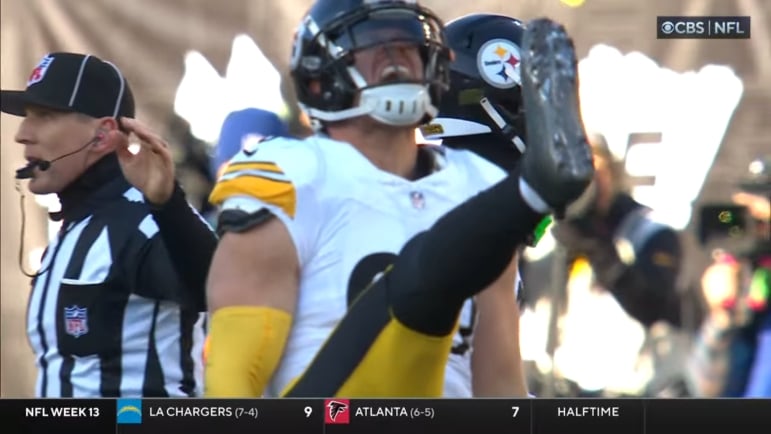Player: OLB T.J. Watt
Stock Value: Up
Reasoning: T.J. Watt followed up one of his worst games in years with another vintage performance. While it might not have shown up on the scoreboard, he was a presence against the Bengals. That included two sacks, a forced fumble, and a season-high five quarterback hits.
Two weeks ago, the Cleveland Browns were successful in nearly erasing T.J. Watt from the game. Even when they left him one-on-one with RT Jack Conklin, they were able to handle him. The Bengals were not nearly as successful in their efforts, however, and it may have been the difference Sunday.
Watt finished the Steelers’ 44-38 win with two sacks, including a strip-sack that led to a recovered fumble. He posted three total tackles for loss and five quarterback hits—season highs in both categories. And it’s not like the Bengals weren’t keying on him because every team does. He just won, although sometimes the coverage helped by buying time for the pass rush.
What’s interesting is that the Steelers didn’t actually make Joe Burrow hold the ball more than average. In fact, his average time to throw was under his season average, but T.J. Watt and the pass rush made him pay when he did hold onto the ball longer than normal.
The thing is, even this game wasn’t peak T.J. Watt, and I’m not sure if that is good or bad. Obviously, that depends on what happens for the rest of the season. Does he hit a groove where he’s dominating, or is he merely excellent now?
For the past several years of his career, Mariano Rivera faced the debate whenever he blew a save. Is the Yankees great finally finished? Has he lost his magic? The answer always turned out to be no. Chances are T.J. Watt will play long enough for the answer to be yes. But don’t expect it to come any time soon.
As the season progresses, Steelers players’ stocks rise and fall. The nature of the evaluation differs with the time of year, with in-season considerations being more often short-term. Considerations in the offseason often have broader implications, particularly when players lose their jobs, or the team signs someone. This time of year is full of transactions, whether minor or major.
A bad game, a new contract, an injury, a promotion—any number of things affect a player’s value. Think of it as a stock on the market, based on speculation. You’ll feel better about a player after a good game, or worse after a bad one. Some stock updates are minor, while others are likely to be quite drastic, so bear in mind the degree. I’ll do my best to explain the nature of that in the reasoning section of each column.








